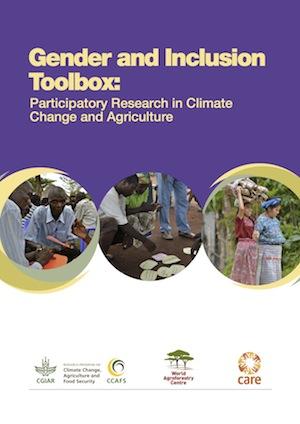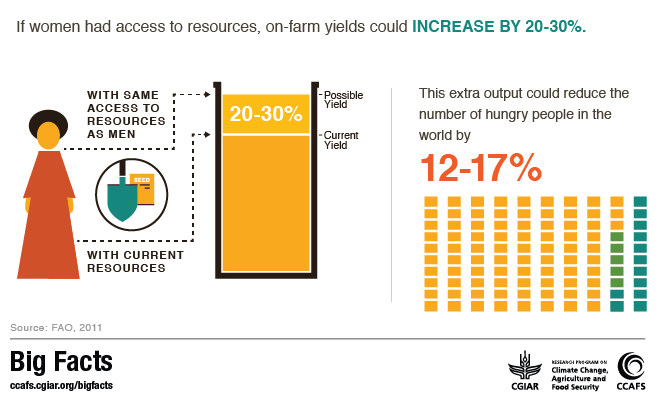Empowering women, empowering humanity

Existing gender inequalities may increase women’s vulnerability to climate change. Tackling gender issues could be the key to averting future food crisis. Find out how we are taking steps to close the gender gap.
How does the CGIAR Research Program on Climate Change, Agriculture and Food Security (CCAFS) contribute to meaningful gender research? On International Women’s Day, we collected some of the many initiatives we have taken to address gender gap in agriculture.
If you want to know more about research on closing the gender gap in farming under climate change:
- read our special blog series on Closing the gender gap
- watch the presentations and the panel discussion from the Closing the gender gap event
- follow the #AgGenderGap event hashtag on twitter
A substantial part of CCAFS work deals with addressing challenges women face in agriculture. A major activity aims at having positive impact on social inclusion for both men and women farmers by providing relevant gender analyses for the research program, support and knowledge on how to integrate gender as a perspective into the work.
read more about the gender and equity theme
Gender-based research: a priority
Women, in both “developed” and “developing” countries, are experiencing inequality, from receiving lower wages than men, carrying much of the workload in the households and/or on farms, are being kept out from decision-making board-rooms and meetings, and face other injustices on a daily basis. This in the end might impact women’s abilities to adapt to a changing climate or participate in mitigation activities.
READ: Gender: from latecomer to shaping a new research agenda for agriculture and climate change
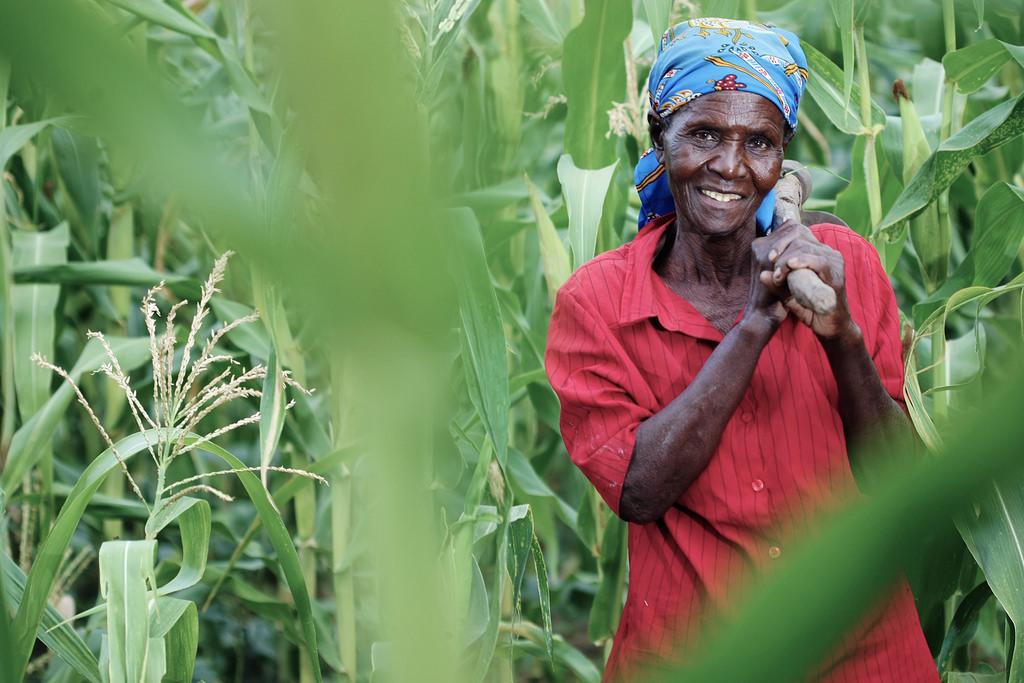
8 march is dedicated to the celebration of women around the world. see selected ccafs photos of women in agriculture
In addition, women can adopt and sustain climate change strategies and good agricultural practices when given the opportunity, in many cases they are just as likely as men to adopt climate-smart practices. However, the adoptation of climate change practices among women is tied to the unequal access of resources between men and women, and this includes limited decision making abilities for women in rural households.
READ: new analysis suggests gender differences in how farmers adapt to climate-smart agriculture
Targeting women with climate and agricultural information is likely to result in adoption of climate-smart agricultural practices for adaptation. The CCAFS working paper Adaptation Actions in Africa: Evidence that Gender Matters has identified differences between men and women, as well as introduced the discussion on other social factors influencing vulnerability to climate change.
Watch: 3 reasons why agricultural research should be gender inclusive, and 3 ways to do it
If development projects are to succeed, we need to see women as agents of change – as strong drivers for mitigation and adaptation. Tools exist to help research and development projects successfully engage women and ensure equal benefits for both men and women.
read more: women as drivers of positive change
Methods to address gender differences
Last year researchers from CCAFS tested the Gender Toolbox, a practitioner’s guide for gender and social research in Western Kenya and in Ghana.
The Gender and Inclusion toolbox includes several gender-based participatory action research modules that will help researchers and development workers find and analyze gender and social differences in rural communities related to climate change and agriculture.
READ about the benefits of gender-based participatory research
What is required is bold gender-sensitive policies and targeted climate-smart agriculture investments to enable women transform their agriculture from subsistence to market oriented, while actively involved in the whole value chain. If women had access to resources such as land, new agricultural knowledge, inputs and ability to make decisions on what to grow, when and how, on - farm yields could increase by 20-30 %.
read: women farmers key to food security in africa
Participatory research: examples from CCAFS regions
CCAFS carried out a study in Kenya to find out what the term female empowerment meant for women farmers. For many of the women in the group, an empowered woman is educated, either having a university degree or college certificate, and has the respect of the community. The participants agreed that studying agriculture can help her become a good farmer.
read more about gender dynamics and climate change adaptation in kenya
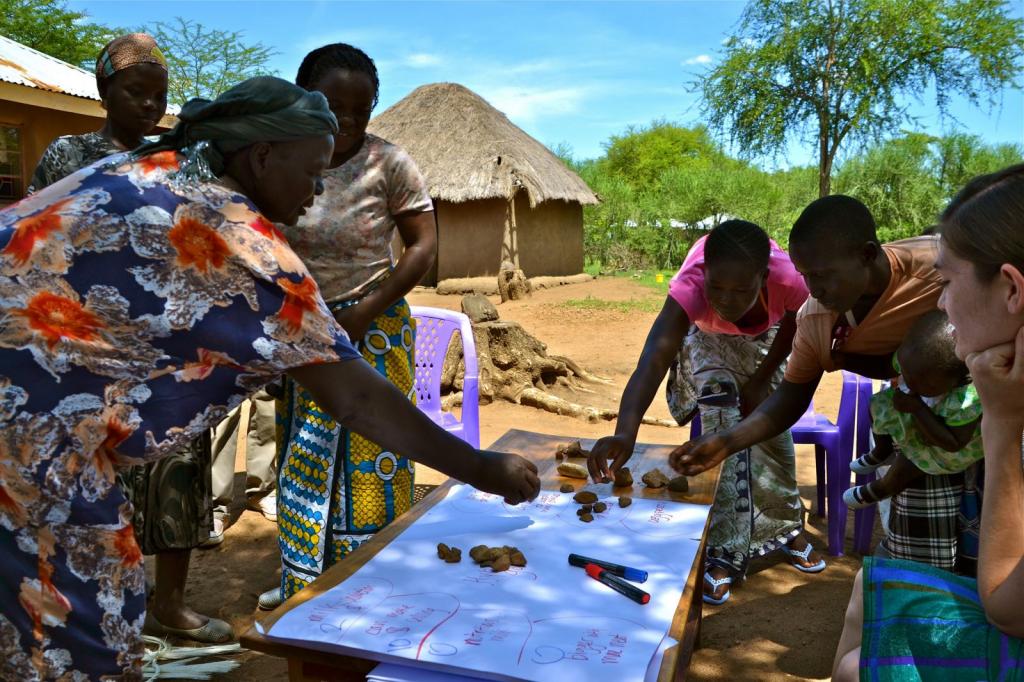
it is important to better understand how women perceive empowerment.
In Kaffrine, Senegal, focus group discussions with farmers revealed that men and women have very different roles in the community and in agriculture, and these differences account for the large gaps in climate information needs and access.
one size does not fit all: considering gender, equity and power in climate information services
With the ambition to transform the unequal playing field for women and to ensure that climate adaptation activities benefit men and women farmers equally, CCAFS South Asia organised a series of “train-the-trainer workshops” on the theme: gender, agriculture and climate change. The workshops aimed to increase local women leaders' understanding of what climate change is, illustrate the differentiated impacts on male and female farmers and show how farming in their regions will be affected.
In Lima, Peru, a pre-COP20 workshop focused on how we can include gender in climate change adaptation and mitigation policies in Latin America. This was done through emphasizing the importance of gender for agriculture, food security and climate change through group work.
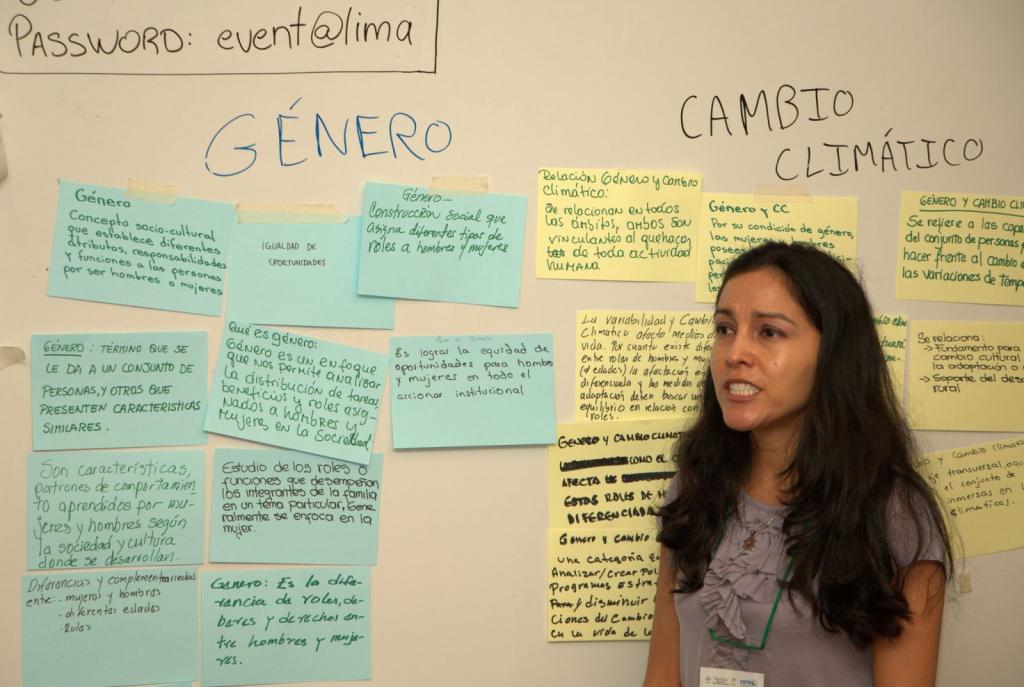
sharing the gender and climate change concept by the workshop participants. Photo: Gian betancourt (CIAT)
“Just making men and women more aware of their different roles and responsibilities is a step forward. We work in a context – smallholder agriculture – where men are not always empowered either. That is why our overall aim is to increase the empowerment of both men and women: to reduce empowerment gaps within communities generally in agriculture,” said Jennifer Twyman in an interview at the Gender and Agriculture Research Network Annual Meeting in the Philippines. READ THE INTERVIEW
Closing the gender gap
At our next high-level event on 19 March we aim to share cutting-edge knowledge and evidence on closing the gender gap in farming under climate change, and to convene thinkers and doers in a forum to inspire renewed action.
Lili Szilagyi is a student assistant at the CCAFS Coordinating Unit focusing on communications, social media and web content management.

